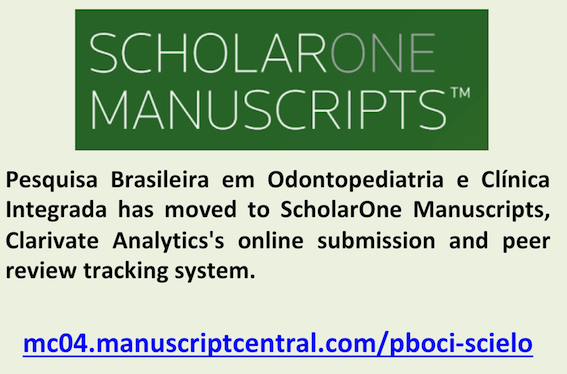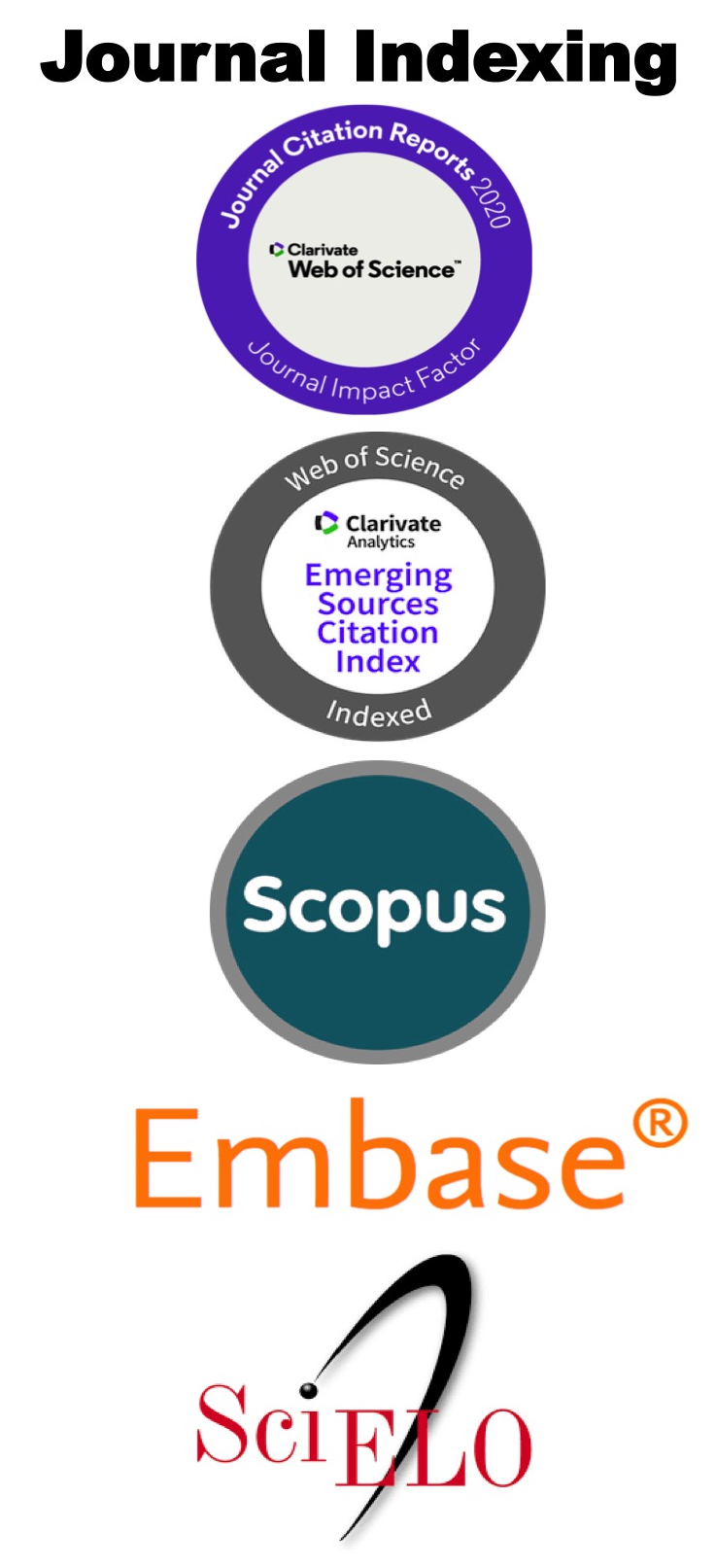Endodontists’ Self-Assessment about Pharmacological Strategies for Management of Endodontic Pain
Keywords:
Endodontics, Toothache, KnowledgeAbstract
Objective: To assess the pharmacological strategies of a group of Brazilian endodontists regarding endodontic pain. Material and Methods: Specialists answered a questionnaire with two main themes: 1) Pharmacological prescription patterns and 2) Endodontic procedures and risk of postoperative pain. The collective data were presented as descriptive statistics. Results: Almost all endodontists reported using drugs for pain management, mainly for apical abscess (65.8%) and irreversible pulpitis (61%), as well as more after (59.6%) than before (23.3%) endodontic procedure. Dipyrone (72.6%) and ibuprofen (56.8%) were the most prescribed systemic drugs. The most used local anesthetics were mepivacaine (58.2%) and articaine (57.5%). When necessary, 74.7% of specialists use supplementary anesthesia with an additional technique. Extravasation of filling materials (81.5%), limit of apical obturation (71.2%), and instrumentation (66.4%) 1 mm beyond were the main endodontic procedures to increase the risk of postoperative pain. Conclusion: While most strategies employed by Brazilian Society of Endodontics members are evidence-based, divergences in responses highlight the need for further research. This underscores the importance of more profound insights and potential standardization in pain management strategies among professionals.References
International Classification of Orofacial Pain, 1st edition (ICOP). Cephalalgia 2020; 40(2):129-221. https://doi.org/10.1177/0333102419893823
Khan AA, Diogenes A. Pharmacological management of acute endodontic pain. Drugs 2021; 81(14):1627-1643. https://doi.org/10.1007/s40265-021-01564-4
Marending M, Paqué F, Fischer J, Zehnder M. Impact of irrigant sequence on mechanical properties of human root dentin. J Endod 2007; 33(11):1325-1328. https://doi.org/10.1016/j.joen.2016.09.010
Nixdorf DR, Moana-Filho EJ, Law AS, McGuire LA, Hodges JS, John MT. Frequency of persistent tooth pain after root canal therapy: A systematic review and meta-analysis. J Endod 2010; 36(2):224-230. https://doi.org/10.1016/j.joen.2009.11.007
Nogueira BML, Silva LG, Mesquita CRM, Menezes SAF, Menezes TOA, Faria AGM, et al. Is the use of dexamethasone effective in controlling pain associated with symptomatic irreversible pulpitis? A systematic review. J Endod 2018; 44(5):703-710. https://doi.org/10.1016/j.joen.2018.02.006
Abbott PV. Present status and future directions: Managing endodontic emergencies. Int Endod J 2022; 55(3):778-803. https://doi.org/10.1111/iej.13678
Pak JG, White SN. Pain prevalence and severity before, during, and after root canal treatment: A systematic review. J Endod 2011; 37(4):429-438. https://doi.org/10.1016/j.joen.2010.12.016
Wolf E, Leonard K, Vidigsson M, Tegelberg Å, Koch M. Adoption of change in endodontic practice after an educational program: A qualitative study. Clin Exp Dent Res 2022; 8(3):781-792. https://doi.org/10.1002/cre2.542
Alí A, Olivieri JG, Duran-Sindreu F, Abella F, Roig M, García-Font M. Influence of preoperative pain intensity on postoperative pain after root canal treatment: A prospective clinical study. J Dent 2016; 45:39-42. https://doi.org/10.1016/j.jdent.2015.12.002
Jang YE, Kim Y, Kim BS. Influence of preoperative mechanical allodynia on predicting postoperative pain after root canal treatment: A prospective clinical study. J Endod 2021; 47(5):770-778.e1. https://doi.org/10.1016/j.joen.2021.01.004
Nagendrababu V, Pulikkotil SJ, Veettil SK, Teerawattanapong N, Setzer FC. Effect of nonsteroidal anti-inflammatory drug as an oral premedication on the anesthetic success of inferior alveolar nerve block in treatment of irreversible pulpitis: A systematic review with meta-analysis and trial sequential analysis. J Endod 2018; 44(6):914-922.e2. https://doi.org/10.1016/j.joen.2018.02.017
Shirvani A, Shamszadeh S, Eghbal MJ, Marvasti LA, Asgary S. Effect of preoperative oral analgesics on pulpal anesthesia in patients with irreversible pulpitis-A systematic review and meta-analysis. Clin Oral Investig 2017; 21(1):43-52. https://doi.org/10.1007/s00784-016-1974-1
Smith EA, Marshall JG, Selph SS, Barker DR, Sedgley CM. Nonsteroidal anti-inflammatory drugs for managing postoperative endodontic pain in patients who present with preoperative pain: A systematic review and meta-analysis. J Endod 2017; 43(1):7-15. https://doi.org/10.1016/j.joen.2016.09.010
Santini M, Da Rosa RA, Ferreira MB, Barletta F, Longo do Nascimento A, Weissheimer T, et al. Medications used for prevention and treatment of postoperative endodontic pain: A systematic review. Eur Endod J 2021; 6(1):15-24. https://doi.org/10.14744/eej.2020.85856
Lipton JA, Ship JA, Larach-Robinson D. Estimated prevalence and distribution of reported orofacial pain in the United States. J Am Dent Assoc 1993; 124(10):115-121. https://doi.org/10.14219/jada.archive.1993.0200
Pigg M, Nixdorf DR, Law AS, Renton T, Sharav Y, Baad-Hansen L, et al. New international classification of orofacial pain: What is in it for endodontists? J Endod 2021; 47(3):345-357. https://doi.org/10.1016/j.joen.2020.12.002
Schuh CMAP, Benso B, Aguayo S. Potential novel strategies for the treatment of dental pulp-derived pain: Pharmacological approaches and beyond. Front Pharmacol 2019; 10:1068. https://doi.org/10.3389/fphar.2019.01068
Larocca de Geus J, Nogueira da Costa JK, Wambier LM, Maran BM, Loguercio AD, Reis A. Different anesthetics on the efficacy of inferior alveolar nerve block in patients with irreversible pulpitis: A network systematic review and meta-analysis. J Am Dent Assoc 2020; 151(2):87-97.e4. https://doi.org/10.1016/j.adaj.2019.09.002
Nagendrababu V, Pulikkotil SJ, Suresh A, Veettil SK, Bhatia S, Setzer FC. Efficacy of local anaesthetic solutions on the success of inferior alveolar nerve block in patients with irreversible pulpitis: A systematic review and network meta-analysis of randomized clinical trials. Int Endod J 2019; 52(6):779-789. https://doi.org/10.1111/iej.13072
Kim JE, Cho JB, Yi WJ, Heo MS, Lee SS, Choi SC, et al. Accidental overextension of endodontic filling material in patients with neurologic complications: A retrospective case series. Dentomaxillofac Radiol 2016; 45(5):20150394. https://doi.org/10.1259/dmfr.20150394
Renton T. Trigeminal nerve injuries. Aust Endod J 2018; 44(2):159-169. https://doi.org/10.1111/aej.12251
Downloads
Published
How to Cite
Issue
Section
License
Copyright (c) 2024 Pesquisa Brasileira em Odontopediatria e Clínica Integrada

This work is licensed under a Creative Commons Attribution-NonCommercial 4.0 International License.



